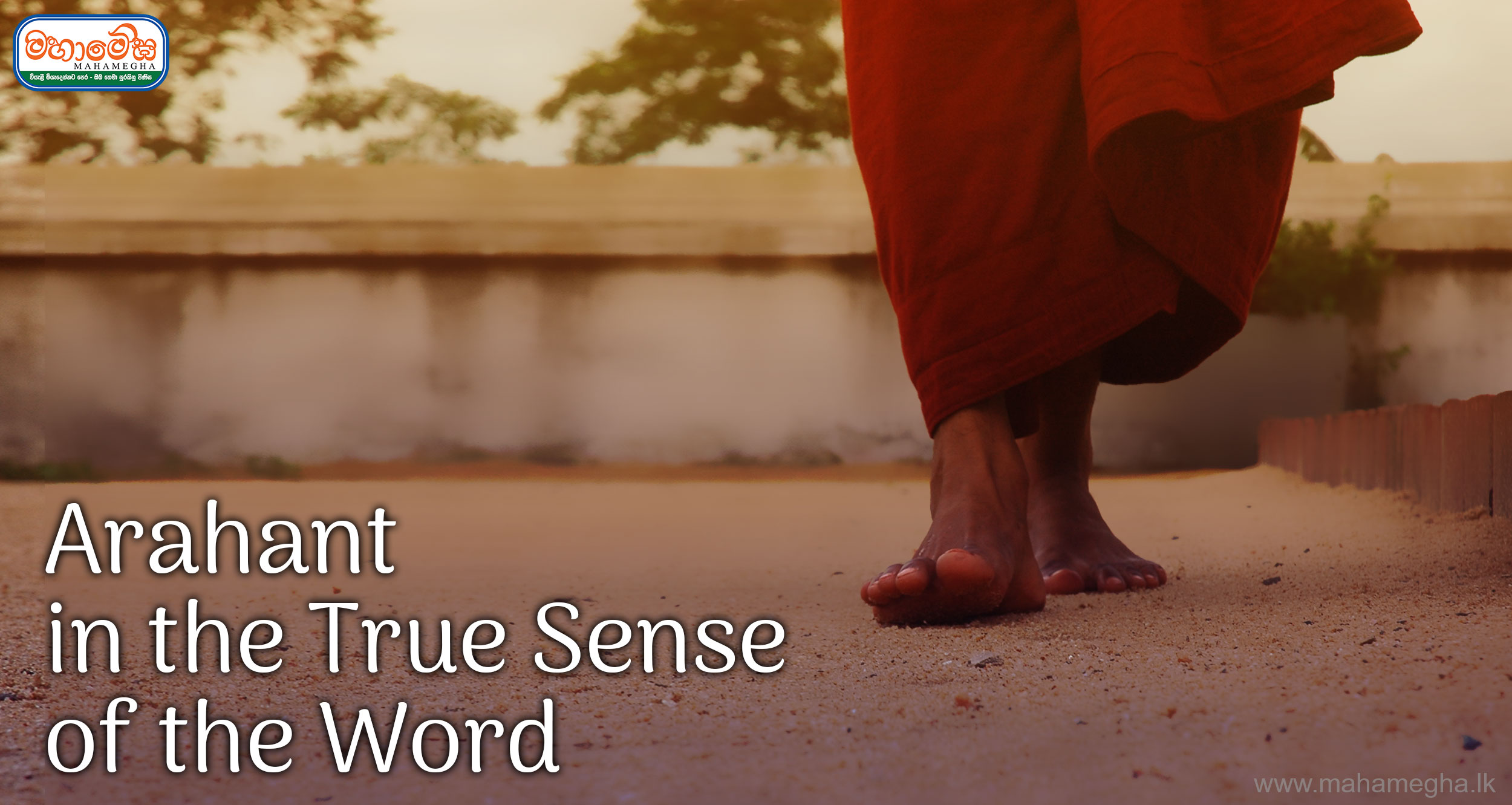In a time where so-called Arahants – apparently both lay and monastic – seem to be mushrooming out of nowhere, creating uncertainty and doubt among pure disciples of the Buddha, it is imperative that one understands the true nature of Arahants based on the Canonical discourses, the original words of the Buddha.
The Sūkarakhata Sutta in the Indriyasaṃyutta of the Saṃyutta Nikāya, a discussion between the Buddha and the Great Arahant Sāriputta, the foremost disciple in wisdom, serves as an excellent criterion for understanding the innate qualities of an Arahant, who himself has realized to the fullest extent the Buddha’s Teachings. In this sutta, the Buddha questions the Venerable Sāriputta in the following manner:
“Considering what benefit, Sāriputta, does a bhikkhu devoid of the taints [an Arahant] conduct himself in a way that shows great love and respect towards the Tathāgata and the Tathāgata’s Dispensation?”
To which the Venerable Sāriputta answers:
“Venerable sir, it is considering as benefit the unsurpassed security from bondage – the experiencing of Nibbāna – that a bhikkhu devoid of the taints conducts himself in a way that shows great love and respect towards the Tathāgata and the Tathāgata’s Dispensation.”
Pleased by the Venerable Sāriputta’s answer, the Buddha praises the Arahant Sāriputta thus:
“Good, good, Sāriputta! For, Sāriputta, it is considering as benefit the unsurpassed security from bondage – the experiencing of Nibbāna – that a bhikkhu devoid of the taints conducts himself in a way that shows great love and respect towards the Tathāgata and the Tathāgata’s Dispensation.”
This statement clearly exemplifies that an Arahant who experienced for himself the supreme bliss of Nibbāna would possess boundless love and respect for the Buddha and his Dispensation. In stark contrast, the present day “Arahants” seem to lack these palpable qualities, and are instead against paying respect to the Buddha, as they publicly denounce venerating stūpas, Bodhi Trees, and even go to the extent of disparaging the relics (dhātu) of the Buddha—calling them mere ‘skeletal remains.’
“And what, Sāriputta, is the unsurpassed security from bondage that a bhikkhu devoid of the taints considers as the benefit when he conducts himself in a way that shows great love and respect towards the Tathāgata and the Tathāgata’s Dispensation?”
Then the Venerable Sāriputta answers:
“Venerable sir, here a bhikkhu devoid of the taints develops the faculty of confidence, which leads to peace, leads to enlightenment. He develops the faculty of energy … the faculty of mindfulness … the faculty of concentration, which leads to peace, leads to enlightenment. He develops the faculty of wisdom, which leads to peace, leads to enlightenment. Venerable sir, this is the unsurpassed security from bondage that a bhikkhu devoid of the taints considers as the benefit when he conducts himself in a way that shows great love and respect towards the Tathāgata and the Tathāgata’s Dispensation.”
Here, the faculty of confidence (saddhā indriya) is one’s belief in the Buddha’s realization. The faculty of energy (vīriya indriya) refers to the fourfold striving: the striving to prevent unarisen, unwholesome states from arising; the striving to eradicate arisen unwholesome states that have already arisen; the striving to develop wholesome states that have not yet arisen; and the striving to further develop and perfect wholesome states that have already arisen. The faculty of mindfulness (sati indriya) is the four establishments of mindfulness. The faculty of concentration (samādhi indriya) refers to the four jhānas. Further, the faculty of wisdom (paññā indriya) is insightful wisdom. Therefore, an Arahant embodies the fulfillment of these five faculties. Moreover, this epitomizes that the Arahants do not blow their own horn, instead, they dwell in utmost love, respect, and gratitude towards the Buddha and his Dispensation.
Then again, the Buddha questions Venerable Sāriputta thus:
“And Sāriputta, what is the great love and respect a bhikkhu devoid of the taints shows towards the Tathāgata and the Tathāgata’s Dispensation?”
The Venerable Sāriputta then answers:
“Venerable sir, here a bhikkhu devoid of the taints dwells reverential and deferential towards the Teacher, the Dhamma, the Saṅgha, the discipline, and concentration. This venerable sir, is that great love and respect a bhikkhu devoid of the taints shows towards the Tathāgata and the Tathāgata’s Dispensation.”
Here, paying respect to the Teacher means to praise the Buddha for showing one the path to freedom from suffering, as opposed to crediting oneself for achieving fruits of the path. This is a salient quality of an Arahant who has abandoned once and for all the notion of “me, mine, and my self.” Therefore, if any person in this world claims himself or herself to be an Arahant, he or she should definitely possess this quality—reverence and deference towards the Buddha.
Accordingly, paying respect to the Dhamma and dwelling with deference towards the Dhamma means not desecrating the words of the Buddha with capricious, idiosyncratic interpretations, nor claiming to have visions of realization in states of meditative absorption, nor speaking based on one’s personal experiences and views.
Likewise, a true Arahant would have much respect towards the Saṅgha, in particular, the lineage of Arahants stemming from Venerable Arahants Sāriputta, Moggallāna, Mahā Kassapa, Ānanda, etc.
Furthermore, a true Arahant would dwell with much respect and deference towards the discipline, the training laid down by the Buddha, and would never even at the cost of his own life overstep the precepts. Sadly, present-day impersonators of Arahants claim that the precepts are “only for trainees,” and they serve no purpose or bear no relevance for Arahants, as they are beyond the precepts. This is an atrocious, pernicious wrong view.
Finally, an Arahant would also possess profound respect towards concentration (samādhi), which paves the way to developing insightful wisdom. It is pertinent that one understand that the jhānas are supramundane states achieved through extreme commitment and devotion to the practice, and should not be considered attainable on a mere whim through haphazard, ill-contrived meditation techniques which more often than not lead to nothing more than self-hypnotism misconstrued as jhānas.
For a wise person, this sutta alone is sufficient to discern between the Great Arahants of the past who bejeweled the Buddha’s Dispensation and the present-day imposters who debase the sublime quality of Arahantship.
The Sūkarakhata Sutta ends with the Buddha seconding and rejoicing in Venerable Arahant Sāriputta’s extolling of the five faculties, which emphasizes clearly the qualities a pure disciple should develop internally to excel in the sublime Dhamma taught by the Buddha:
“Good, good, Sāriputta! For that, Sāriputta, is the great love and respect a bhikkhu devoid of the taints shows towards the Tathāgata and the Tathāgata’s Dispensation.”
The Boar’s Cave (Sūkarakhata Sutta) – Samyutta Nikāya
By a Venerable Thero of Mahamevnawa Buddhist Monastery














Recent Comments